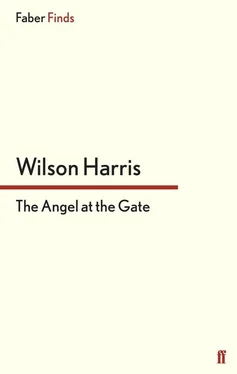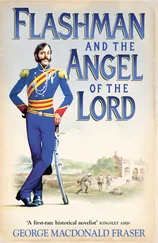Time seemed (as she arose from the bench and moved towards the street) less a progression and more a body of instantaneous parallels, parallel masks and “musics”, parallel mutes and voices, November mists, December echoes, Anancy February, running side by side in fictional trance, fictional transfusions of seasonal, yet perennial blood.
She gained the pavement. The traffic, the passers-by, the light that filtered into sensational apprehension of moving legs and arms possessed a stark simplicity in tune with the faint shadow cast by the naked branches of trees against a suddenly clear sky. Reds, whites, greys on the buildings that lined the street suddenly stood at attention.
Mary knew at last the time had come to visit Stella in hospital. The thought had scarcely crossed her mind when a chariot drew up, a head poked itself through a window. “Hello, Mrs Holiday, can I give you a lift home?” She recognized the driver. His voice was blurred. Had he addressed her as Mrs Holiday or Miss Holiday? Perhaps he appreciated the comedy of wife and sister — that Stella and she were not the same … yet the same… For a moment she was tempted to dismiss him from her automatic book, to wave him along and then she remembered with a smile that he was one of the solemn characters of chariot-and-cat in which a spectral hand had waved at Sebastian. Perhaps he was on the way back to the garage from another funeral.
“How kind of you, Joseph,” she said. He didn’t seem to mind her addressing him by his Christian name though he was always formal with her except for the eyes in his rather puffy face that feasted on her legs. He opened the door and she climbed in beside him. The vehicle shot away as if under its own animal, mechanical, parallel volition, chariot and cat.
She asked him, the cat-faced driver — John’s angelic chauffeur — with his slightly jovial, slightly greedy smile, to turn the chariot through a side street before they came to Olympia and drop her at Stella’s hospital. Joseph nodded as if he knew. He seemed all at once a rather coarse but good-natured mask for someone Mary knew. Who could it be? Had he been sent? Was he the messenger she had awaited as she sat on the bench under the net of the trees?
She alighted at a corner close to the hospital, thanked Joseph with a smile and made her way towards the zebra-crossing or cat-bridge opposite the hospital gates. (The founder of the hospital had specially painted it there — as if the whole world reflected a flattened beast, judgement-day signal, in the flat wall of the street to bear the glimmering tread of feathery souls as light as a butterfly’s wings that slipped through the hospital gates day in, day out, in timeless fictional race of death.)
Mary stopped. She felt she must wait for a split-second. Joseph’s timing had been meticulous and perfect. But Christian patience was implied if it were to marry the chariot’s instinct. He had manoeuvred the vehicle — or been manoeuvred by it — through the traffic to bring her now where she stood in minute-hand time. A flash earlier would have been too early; a flash later too late. For in that very split-second that Mary held — as if once again in that long day she had been reduced to stone — Stella emerged from the hospital gates and set foot on the crossing. In that instant the traffic stopped, unconscious of stopping, unmoving though moving. Everything stood at attention. Stella looked pale as the face of Proudhon’s watch. She was transparent, Mary saw, as a feather and one almost saw through her into the echo of the iron fence or hospital building standing at attention on the other side of the road. It was an echo so still it left her imperceptibly shaken as if an underground train passed under her feet bearing joy and sorrow.
It was true, Mary thought, in a corner of her mind, that every unprepossessing or prepossessing vehicle subsists on a buried echo, echo of attention, echo of foundation, at the moment of death. Stella was beautiful despite her casual attire. It was the beauty of longing for flight — a longing beyond foundations and echoes, a longing that gives the human species its unique essence written into mortal bone, mortal gait that mimics the immortal dance of soul on waving air or deck of a ship. To die is to wave every chariot down, to stop every city that knows not it has stopped.
Mary recalled (as if she felt Christ’s fingers tug at her skirt) Joseph’s subtly devouring eyes upon her legs, her breasts, her body. The sensation invaded her from nowhere, it seemed, the sensation of news from nowhere and of being “eaten” by John’s teeth, and this made her wonder whether Stella was the maternal wraith, uneaten, whole, and she the morsel, cat and mouse, Stella and Mary.
“Oh my god,” Mary said aloud. “Stella has died. And yet I am scared. She’s like a divine cat as she crosses the road. She lives in John. John will eat me some day. Or shall I eat him?”
Stella heard her voice and rushed across the bridge of the street into her arms. They seemed almost indistinguishable one from the other as they embraced, longing to stay, longing to move, bound together yet inwardly torn, inwardly fighting each other. Stella knew she was the stronger one now, that the zebra-cat in the street was in her blood, that the soil, the stilled city, the buildings at attention, were in her blood, that she could leap nevertheless across worlds.
“Let me take you to Father Marsden,” said Mary. “I know you can’t go home in your state of mind. He will help you. He knows everything.”
“Not everything,” said Stella. “Remember that when I’m gone.” She embraced Mary more closely. “But not forever gone. I shall come and go.”
“Come?” said Mary. “Go?”
Stella laughed. “I shall do both, Mary. But first let me ask you a riddle. How is it that before Marsden follows me he will take you to India and on a boat that sails in his house?”
“Boat? Sails in his house?”
Mary felt suddenly terrified. There was an assurance about Stella that seemed to overcome the mad-sounding riddle she had posed. She felt that she could no longer stand there in this close embrace and moving quickly pulled Stella with her.
They made their way to the corner where Joseph Barber — the cat-and-chariot chauffeur — waited for them. There was a lean shadow upon his face now, the vestige of Marsden’s beard, the dust of many landscapes, the moss of many places that stand at attention in skeletal blood. He needed a bath, Mary thought. He opened the door of the chariot. They sped back to Angel Inn.
*
They arrived at the Inn; Mary rang the bell and when no one answered presumed Marsden was out. She was in two minds whether to go or to stay but the chariot had melted away on other business in the city. She recalled the chauffeur whose name was Joseph Barber and upon whom she had discerned a shadowy resemblance to Joseph Marsden, a kind of eccentric lust, an inferior Marsden. A shock of humour almost threaded itself into her distraught mind still reeling a little from the meeting with Stella.
Marsden was a great man, a holy man, but who knows whether perhaps a long time ago he too had been prone to eccentric, bodily desires. She felt closer to him now, he was her superior (not inferior) Joseph, and she smiled as she inserted the key he had given her into the lock, turned it and ran into the house. She rushed Stella into the study and repaired to the large bathroom to wash her hands. It seemed to her they were blackened from the park bench on which she had been sitting or from the chariot.
A moment later the door opened and Stella was standing there. Mary felt subtle terror. It was a huge ornate room and Marsden’s presence was everywhere. The bath was full as if he had just run it and Stella laughed and pointed to a ship that floated against one edge. A picture of Gandhi stared down at them from a high wall. Mary felt Marsden’s presence so acutely and potently it was as if she saw him there in the bath, his bony limbs winning approval from the Indian saint and his black-greying beard dripping rain from the skies on to the sea on which the ship sailed.
Читать дальше












